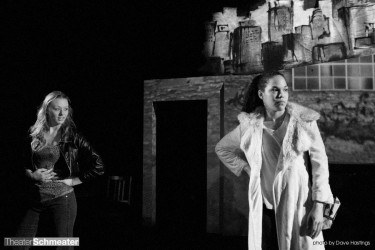Stephen Adly Guirgis has “The Ear.”
Mr. Guirgis has a gift for dialogue, The Ear. It’s bar and street dialogue, what you might have heard in Hell’s Kitchen in New York in the late 90s, where this play is set. The language is rhythmic, even poetic at times, yet grating to middle-class sensibilities. Theater Schmeater’s Director Julia Griffin says the characters resonate with her and the script has been “living in her” for over ten years. With this northwest premiere of In Arabia we would all be Kings she has fulfilled her vision quite well.
Warning: The play and this review contains so-called adult language. I discuss how some English words became taboo in the note at the bottom of my review of Guirgis’s The Motherf**ker with the Hat.
The drivers of the plot are mostly unseen and off stage. In 1999, gentrification relentlessly moved west from Broadway to the Hudson River. Hell’s Kitchen, now renamed Clinton or Midtown West by real estate promoters, runs north from 34th Street to 59th Street, and west from Eighth Avenue to the Hudson River. Republican Mayor Rudy Giuliani pushed to “clean up” Times Square—to sweep away the gritty, rough street life for something closer to a Disney theme park. As one character lamented: “Disney is spreading faster than the AIDS.” The city had begun planning for this change as early as 1969, but if you are a member of the sub-classes of the city all you do is react, and even that you do too late and too alone and not very well.
The rundown bar where much of the action occurs is less a home than a place out of the elements, while it lasts. Lenny (Drew Hobson) returns to his old haunt after serving 6 years. He was repeatedly gang raped in prison, now he’s all bluster and challenge as he struggles to reset his sense of manhood. In Guirgis’s trademark “kick the can” fashion, Drew harassed Skank (Nik Doner) for no reason—Skank was only eating peanuts out of the bowl on the bar.
Jake’s bar is peppered with your random bar types: a chronic drunk; a hooker and Skank hustling for their next crack fix, each in their own way; Lenny’s girlfriend Daisy and a friend of Lenny’s and her daughter Damaris dropping by to welcome him back.
Since the plot drivers are very large and impersonal, Guirgis’s script is better understood as a set of interweaving character studies. Here’s the rundown.
Daisy (Elena Flory-Barnes) lives with Lenny at Lenny’s mother’s apartment. When she wants to needle him she reminds him that he still lives with his mother. Men flirt or court her with promises of steak dinners at Sizzler. Not surprisingly, she’s not been faithful as she waited for Lenny’s release.
In one vivid scene that puts the loss of personal integrity and self-worth in high relief, a wealthy gay stranger (Greer, played by Draeko Damen) offers Skank $20 for a blow job. Skank toggles between upholding his self-respect and desperately needing the money. Skank wants more for less service, Greer knows he’s desperate and stands pat. Skank says “You don’t know the market value for this out here,” falling neatly into the capitalist mindset. Though we never see the scene, Jake, the bar’s owner, probably said something similar to Greer as they negotiated the price of the bar.
Chickie (Jacquelyn Miedema) is a white hooker hustling for her next high. Chickie is continually in motion and has that sniffling tic that chronic cocaine users develop.
Seventeen year old Demaris (Ayo Tushinde) is fond of her child and her gun. She needs money, too. In the first scene she gets right up in Lenny’s face with the pistol at his neck and gets him to confess to being gang raped in jail. Realizing what’s she’s done she back off, saying “I was just playin.”
Demaris enlists Chickie’s help in learning to turn tricks, after pointing the gun at her. Hookers are at the bottom and the better they act that way the more tricks they turn. Demaris has the gansta attitude and, as evident with how she freely waves the gun around. She wants to dominate others, or at least feel respected. Chickie tells her, “You know, you don’t have to do this. You could rob.” Her idea of career options!
Sammy (Michael Ramquist) is the bar’s resident drunk. Whenever he awakens he looks fearfully about and asks whether his wife is there. No telling how long it’s been since she kicked him out. His philosophical advice is “don’t marry a good woman, marry a bitch and you’ll sleep better at night.” He also delivers the title lines while being evicted by the new owners, “In Arabia we would all be Kings.” Sorry Sammy, you wouldn’t be Kings there, either.
Jake (Brandon Felker), owner of the bar, sells the bar to Greer and has won Daisy’s affections away from Lenny. When Lenny learns this, Lenny promises Daisy he’ll get a job, take her to a steak dinner, then a show, then a carriage ride through Central Park … and then come back and put a bullet through Jake’s head. Jake calls his bluster and his bluff. Guirgis has Jake drive the last stakes through Lenny’s shattered self-esteem:
Big talk, zero action! You ain’t gonna do a damn thing. Why? Because you ain’t shit. I seen thousands like you 30 years in this sewer! You know what you are? You’re garbage pal, loser garbage. Look at me! You should jump in the friggin Hudson, sink to the bottom wit’ the rest of the crap, ya pussy.
Instead of furniture for creating the sets, Set/Projection Designer Ahren Buhmann projected images on the wall behind the bar. The furniture and props were relatively spare as a result: a bar with three high stools, a table where Sammy drank and slumbered, and a park bench waiting its turn on the right side of the stage.
In Arabia We’d all be Kings by Stephen Adly Guirgis, directed by Julia Griffin. Runtime 2 hr 45 min with one intermission. Due to explicit language and sexual situations no one under 17 permitted without accompanying parents. Theater Schmeater. 2125 Third Avenue. Jan 22 – Feb 13, Thur – Sat at 8 PM. Tickets from schmeater.org or 206 324-5801 . Closes Feb 13.




















